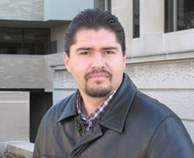Alejandro Dominguez

Alejandro Dominguez (Photo: Jennifer Linzer)
When Alejandro Dominguez was 16, a "positive" identification sent him to prison; DNA proved him innocent 12 years later
Alejandro Dominguez, a Mexican national, was convicted in 1990 of raping a Caucasian woman the previous year in Waukegan, Illinois.
The only evidence purporting to link Dominguez to the crime was a dubious identification by the victim and forensic results that did not exclude him as the source of biological material recovered from the victim.
Although Dominguez was only 16 at the time of the crime and had no criminal record, he was tried as an adult. On advice of counsel, he waived a jury in favor of a bench trial before Lake County Circuit Court Judge Harry D. Hartel.
The evidence
Hartel found Dominguez guilty, even though: The victim had told police that her attacker wore a diamond earring in a pieced ear — but Dominguez had no pierced ear. The victim had told police her attacker had a tattoo — but Dominguez had no tattoo. The victim had told police her attacker addressed her in English — but witnesses testified that Dominguez spoke only Spanish.
The victim's testimony was additionally suspect because the identification procedure employed by the Waukegan Police had been suggestive; the victim acknowledged on cross examination that the lead detective in the case told her before she made the identification, "Watch the one sitting on the chair. Tell me if that is the one . . ."
William Wilson, a forensic serologist from the Northern Illinois Crime Laboratory, testified that he could not eliminate Dominguez as a source of the biological material — semen — recovered from the victim. Wilson did not volunteer what portion of the male population was included among the possible sources. Had he been asked, or had he chosen to fairly portray his findings, the answer would have been 67% — or more than two-thirds of all men in the world.
Despite the flimsy evidence, Hartel deemed Dominguez guilty and sentenced him to 9 years. With day-for-day good time and credit for time served in jail before trial, Dominguez was released from prison in December 1994.
The vindication
Six years after his release, by which time he had married and fathered a child, the U.S. Immigration and Naturalization Service threatened to deport Dominguez for failing to register as an ex-sex offender. At this point, he retained defense lawyers Jed Stone and John P. Curnyn to seek DNA testing of the supposedly inculpatory biological evidence in the case.
In 2001, Lake County Circuit Court Judge Raymond McKoski granted a motion for DNA testing — at Dominguez's expense. And in March 2002, the results of the testing by the Serological Research Institute in Richmond, California, positively excluded Dominguez as the source of biological material recovered from the woman who had positively identified him and sent him to prison 12 years earlier.
Dominguez was officially exonerated on April 26, 2002, when Judge McKoski granted a motion in which prosecutors joined Stone and Curnyn in asking that the conviction be set aside.
No apology
However, the prosecution was unapologetic for the error that cost the innocent youth more than four years of his life. "I won't apologize for the original conviction," Michael G. Mermel, chief of the felony trial division at the Lake County State's Attorney's Office, told the Chicago Tribune. "At the time, the science didn't exist, and we had a credible witness."
On August 3, 2005 — in response to a petition filed by Center on Wrongful Convictions attorney Jane Raley, and her students — Illinois Governor Rod Blagojevich granted Dominguez a pardon based on innocence, which also qualified him for compensation from the Illinois Court of Claims.
On October 17, 2006, a federal jury awarded Dominguez $9 million for the violation of his civil rights by the Waukegan Police Department.
— Rob Warden

